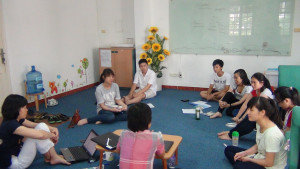1. Introduction
The RTCCD is one of the pioneering organizations in Viet Nam integrating gender equality promotion and prevention of violence against women and children into community-based interventions. RTCCD places special emphasis on vulnerable groups—particularly women and children—drawing on evidence in maternal mental health, early childhood development, and gender equality. Alongside its flagship maternal and child health programs (since 1998) and Early Childhood Development (ECD) initiatives (since 2014), RTCCD identifies the prevention of violence against women and children (No VAW/VAC) as a priority area due to its profound impact on mental health, family wellbeing, and the development of children.
2. Research on Gender Norms and Domestic Violence
From 2018 to 2020, RTCCD and Monash University (Australia) implemented a cluster randomized controlled trial (cRCT) in 84 communes and wards of Ha Nam province, involving 1,245 pregnant women and their husbands. The collected data included:
- History of violence against pregnant women (VAW)
- Maternal mental health status (DASS-21)
- Gender attitudes and behaviors toward wives and children
- Sociodemographic factors, knowledge of nutrition, and child development
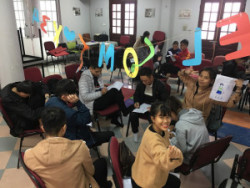 |
The study demonstrated a strong correlation between inequitable gender norms among men and their likelihood of using violence, underscoring the urgency of interventions targeted at men. RTCCD’s longitudinal data show that women exposed to violence during the first six weeks postpartum are 4 to 7 times more likely to have a child who becomes stunted by age three. |
In 2020, RTCCD conducted a study examining men’s gender attitudes, behaviors, and respect for women’s rights, and exploring the link between gender norms and violent behaviors. Key findings include:
- Nearly 30% of women had experienced intimate partner violence (emotional, physical, or sexual) at some point in their lives.
- About 6% experienced violence within the first six months postpartum.
RTCCD also measured adult disciplinary practices toward children using UNICEF’s MICS tools to assess harsh punishment and non-violent parenting (2020). Currently, another study (2025) to collect the child discipline, targeting children 0-5 years, is being conducted in 5 provinces in Vietnam.
3. Community-Based Interventions
RTCCD adapted the WHO e-learning for health care providers to respond to violence against women for health workers on the identification and support of pregnant women experiencing domestic violence during any health facility visit. The adapted course includes reading materials, videos, screening tools, and guided practice.
 |
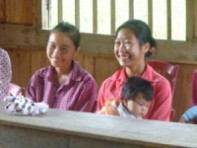 |
 |
To strengthen the capacity of social workers and community collaborators in identifying and responding to cases of violence against women and children, RTCCD developed a series of online courses on gender-based violence (VAW) and trauma-informed mental health support. Through the platform “kynangctxh.vn”, RTCCD introduced:
- Course 5 – Early Identification and Support for Pregnant Women Experiencing Domestic Violence: Focusing on early detection, counselling, therapeutic approaches, and connecting survivors to community social work networks, women’s union officers, and local authorities. The course emphasizes safety planning, assessment tools, confidentiality, and inter-sectoral collaboration.
- Course 4 – Healing Support and Therapeutic Interventions(Trauma-Informed Care): Equips learners with knowledge on trauma, bereavement, emotional responses, and practical healing skills, helping social workers provide safe and supportive care while maintaining their own wellbeing.
RTCCD implemented a pilot project targeting workers in industrial zones—a group at high risk of domestic violence and harsh child discipline. Two online courses (“Parental Emotion Management” and “Positive Communication with Your Children”) and the 4-hour in-person workshops were taken by over 3000 workers. The intervention aimed to reduce harsh punishment and enhance loving communication between family members. It is considered feasible and scalable, aligning with the national gender equality strategy and the government-approved program on lifelong learning for workers (Decision No. 1268/QĐ-TTg).
RTCCD aims to scale its online training and community interventions to at least one million workers and parents in industrial zones, contributing to safer and more nurturing environments for women and children in Viet Nam.
| Especially, in the “Early Journey of Life (EJOL)” program, which focuses on the first 2,000 days of children’s life, RTCCD promotes the role of fathers in maternal and child care. Father-inclusive messages and images are integrated into books, videos, and communication materials, portraying fathers as engaged caregivers—doing housework, caring for children, and showing affection. WHO-recommended gender equality messages are incorporated to foster behavior change among caregivers. EJOL’s videos “A Good Husband” and “A Good Father” have been widely shared and positively received by women. | 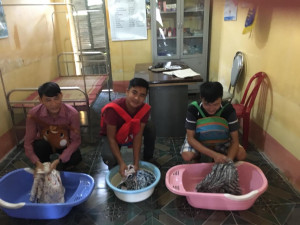 |
To increase father participation, EJOL applies strategies such as:
- Encouraging fathers and grandparents to join group sessions and home visits
- Organizing group meetings on vaccination days to increase attendance
- Providing incentives for clubs with active male participation
After six months, male participation increased to 40%, and grandparent participation doubled to 47%. Many women reported their husbands became gentler, more supportive at home, and more engaged in childcare.
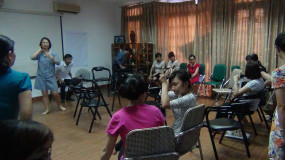 |
 |
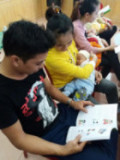 |
By integrating gender equality, EJOL contributes to improved maternal mental health, healthier family relationships, and prevention of VAW/VAC—building safer, more loving environments for all family members.
4. Approach and Strategics in Gender Empowerment
RTCCD’s work in VAW/VAC is grounded in a multi-tiered intervention framework:
- Research and Evidence: Identifying risks and exploring links between violence and maternal–child physical and mental health.
- Training and Capacity Building: Equipping frontline workers with tools, knowledge, and referral skills to identify and support survivors of violence.
- Communication and Behavior Change: Promoting positive, equitable, and violence-free family relationships.
Our Strategies for Gender Empowerment:
- Mainstream gender equality into all RTCCD programsincluding ECD, social work, and prevention of alcohol-tobacco harms.
- Expand interventions to industrial zones—where research and programming on VAW/VAC remain limited.
- Collaborate with the Viet Nam General Confederation of Labour to institutionalize workplace-based VAW prevention policiesand develop in-house personnel in factories to detect, counsel, and refer cases of violence.


